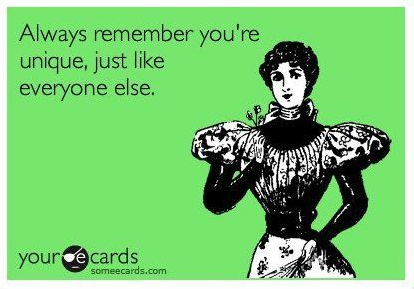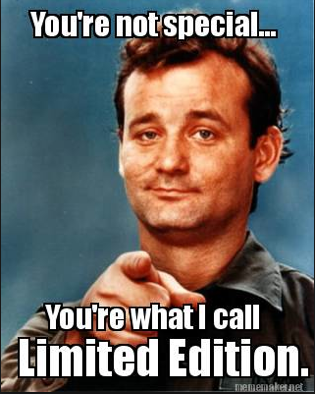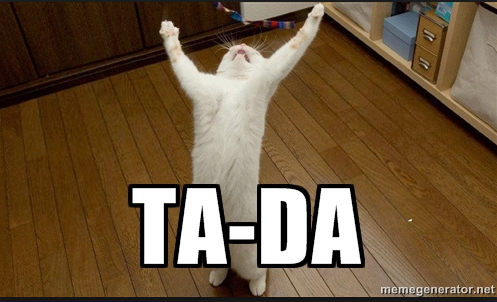
Normally my blogs are all about telling y’all you are not a special unique snowflake. But yeah y’all are but don’t get a big head about it 😛 . We just need to discern the places we are not special (I.e. we all have to do the work) and figure out the places we are and then USE that, especially when it comes to creating an author brand.

We’re now into the Digital Age, and the ramifications of a connected world are still being revealed daily. But, there’s one trend I’d be hard-pressed to argue with. The 20th Century was all about homogeneity. Madison Avenue flourished by telling us which clothing brands made us cool, which car made us special, what foods were “healthy.”
Information was controlled by gatekeepers and commodities restricted by retailers, thus homogeneity was the goal. Homogeneity was simpler and required less paperwork and thinking.
Generations bought Wonderbread because it was “fortified with vitamins” and “good for your kids.” In 1986? Hope you liked stirrup pants. There was a cultural need to “fit in” and be like everyone else, especially those who were the “cool kids.”
“Pillars of Same” Go Crashing Down

With the advent of the Internet and widespread use of social media, homogeneity is crumbling. Individualism is now revered more than ever in human history (often to the point of being irritating, but that’s another post).
And, no matter how weird, off-beat, or All-American we want to be? There is a subculture to embrace our style. Mega-trends have lost their power.
What this means is that, as consumers are faced with more and more choices, they’re segregating themselves into smaller and smaller subgroups. Love tattoos? Minis? Tattoos of minis?
Can’t get enough of Jackson Galaxy and cat whispering? Are you Stay-at-Home-Mom who kicks butt on a Roller Derby Team each Saturday? It’s all out there, and most of us are a unique mixture that can’t easily be categorized.

Spawn is a part of the gaming, HALO, NERF and “Shoes are for Suckers” subculture.
What all of this means is that 20 years ago, we knew which table to sit at–Jocks, Preps, Nerds, Geeks, Good Kids, Band Kids, Kid Who Smells Like Old Carpet. The lines were clearer, namely because we had only a handful of networks and limited retail outlets to define our identity.
Now? We have the reins of individual freedom and we like it.
What Does This Mean for Publishing?
Big publishing has a number of limitations. First, their size. Second, massive overhead. Third? 20th Century thinking. They have to find the mega-trend to stay in business, but what does this mean in a marketplace that is rapidly shifting to micro-trends?
NY is less able to spot the micro-trends, because in a world of algorithms, numbers and spreadsheets, one relies on the past to predict the future.
Business is always looking backward in order to move forward. It’s like trying to drive our car using the rearview mirror as the main guide. Says a lot about where we’ve been, but gives limited information as to what’s ahead.
Indies Have Revealed the Micro-Trend

We’ve talked about the Fifty Shades of Grey phenomenon, yet I will point out that I’ve met agents who turned down the manuscript. It was through E.L. James’ massive volume of independent sales that the micro-trend surfaced and then NY could turn this success into a mega-trend. A genre which received little to no attention has grown exponentially.
This was one of the reasons I recommended NY create e-book divisions as early as 2009 (REAL e-book divisions, not vanity-press retreads). Find a good book, give it a chance and see if the trend emerged. If not? The product cost less to produce and the writer could earn a higher royalty.
Even if the book didn’t sell bazillions of copies, writers didn’t have to sell that many books to make a healthy living and be freed up to write more books. Now instead of NY banking the farm on finding the ONE mega-trend, they could reap the rewards of countless micro-trends.
Which is exactly what Amazon has been doing.
Amazon doesn’t need one author to sell two million copies (not that they are opposed to it), but they can easily have 20 or even a 100 authors sell two million copies. The money spends the same.
This is Why Social Media is Vital for Authors
Social media is vital for keeping our fingers on the pulse of the public (code for “readers”). We can use blogging to define our brand then use content to attract those who share our “subculture” tastes (I teach how to do this in my blogging class 😉 ) .
It’s the main reason it’s death to be the All-Writing-All-The-Time-Channel. That’s a one-dimensional subculture that is overfished and quickly grows stagnant.
Also, any writer worth his/her salt is interested in a lot of things.
The more we feed our subculture, the healthier it becomes, and the more loyal.
We are all seeking our peeps, our tribe, our “friends” in a world that has become explosively larger.
Modern humans are overwhelmed with the sheer volume of choices, and, as a response, we stick to what we know. Sure, in 1999 we LOVED the megastore because it was new and shiny. Almost fifteen years later? Mega stores are going extinct.
In fact, in 2012…2012! I spelled out a plan to save Barnes & Noble. They didn’t listen, but apparently Amazon did. B&Ns are going under simply because they failed to appreciate the power of being small.

THIS was in our local mall.
Boutique is BIG
We’ll pay a bit more to shop at the corner market who appreciates our love for exotic sushi, GF hot dog buns, and foie gras. We can buy Wonderbread at a supermarket or go to the small boutique grocer that sells sprouted grains for those of us in the crowd of Wonder-Why-We-EVER-Ate-Wonderbread.
Everyone wins.
Boutique stores thrive, but so do boutique BRANDS.
But There’s a Catch…
To spot and nourish the micro-trend, we must be present.
This is one of the many, many reasons automation gives me a twitch. Micro-trends can earn us a healthy living. A single writer doesn’t need to sell as many books to keep the lights on as NYC does. Also micro-trends have the potential to grow up to be mega-trends.
Spreadsheets can’t tell us as much as people can. And, trust me, people have a lot to say. Numbers can’t tell us as much about the future as relationships can.
What are your thoughts? Do you love a world where you can define your own style? Create your own genres? Mix in your varied interests? Have you met people on social media with similar hobbies that you’d never have met in person?
I LOVE hearing from you!
To prove it and show my love, for the month of SEPTEMBER, everyone who leaves a comment I will put your name in a hat. If you comment and link back to my blog on your blog, you get your name in the hat twice. What do you win? The unvarnished truth from yours truly. I will pick a winner once a month and it will be a critique of the first 20 pages of your novel, or your query letter, or your synopsis (5 pages or less).
Check out the other NEW classes below! Including How to Write the Dreaded Synopsis/Query Letter!
All W.A.N.A. classes are on-line and all you need is an internet connection. Recordings are included in the class price.
Upcoming Classes
NEW CLASS!
Pitch Perfect—How to Write a Query Letter & Synopsis that SELLS
You’ve written a novel and now are faced with the two most terrifying challenges all writers face. The query and the synopsis.
Query letters can be daunting. How do you sell yourself? Your work? How can you stand apart without including glitter in your letter?
***NOTE: DO NOT PUT GLITTER IN YOUR QUERY.
Good question. We will cover that and more!
But sometimes the query is not enough.
Most writers would rather cut their wrists with a spork than be forced to write the dreaded…synopsis. Yet, this is a valuable skills all writers should learn.
Sign up early for $10 OFF!!!
Bullies & Baddies—Understanding the Antagonist September 2nd–September 16th
All fiction must have a core antagonist. The antagonist is the reason for the story problem, but the term “antagonist” can be highly confusing. Without a proper grasp of how to use antagonists, the plot can become a wandering nightmare for the author and the reader.
This class will help you understand how to create solid story problems (even those writing literary fiction) and then give you the skills to layer conflict internally and externally.
Bullies & Baddies—Understanding the Antagonist Gold
This is a personal workshop to make sure you have a clear story problem. And, if you don’t? I’ll help you create one and tell the story you want to tell. This is done by phone/virtual classroom and by appointment. Expect to block off at least a couple hours.
Your Story in a Sentence—Crafting Your Log-Line
September 7th
Log-lines are crucial for understanding the most important detail, “WHAT is the story ABOUT?” If we can’t answer this question in a single sentence? Brain surgery with a spork will be easier than writing a synopsis. Pitching? Querying? A nightmare. Revisions will also take far longer and can be grossly ineffective.
As authors, we tend to think that EVERY detail is important or others won’t “get” our story. Not the case.
If we aren’t pitching an agent, the log-line is incredibly beneficial for staying on track with a novel or even diagnosing serious flaws within the story before we’ve written an 80,000 word disaster. Perhaps the protagonist has no goal or a weak goal. Maybe the antagonist needs to be stronger or the story problem clearer.
In this one-hour workshop, I will walk you through how to encapsulate even the most epic of tales into that dreadful “elevator pitch.” We will cover the components of a strong log-line and learn red flags telling us when we need to dig deeper. The last hour of class we will workshop log-lines.
The first ten signups will be used as examples that we will workshop in the second hour of class. So get your log-line fixed for FREE by signing up ASAP.
Blogging for Authors
September 17th
Blogging is one of the most powerful forms of social media. Twitter could flitter and Facebook could fold but the blog will remain so long as we have an Internet. The blog has been going strong since the 90s and it’s one of the best ways to establish a brand and then harness the power of that brand to drive book sales.
The best part is, done properly, a blog plays to a writer’s strengths. Writers write.
The problem is too many writers don’t approach a blog properly and make all kinds of mistakes that eventually lead to blog abandonment. Many authors fail to understand that bloggers and author bloggers are two completely different creatures.
For those who need help building a platform and keeping it SIMPLE, pick up a copy of my latest social media/branding book Rise of the Machines—Human Authors in a Digital World on AMAZON, iBooks, or Nook.








34 comments
4 pings
Skip to comment form
I like this idea… Everyone has different elements and passions in a mixture that makes them different and interesting… when you find people with the same or similar mixture, it can spark creative cartwheels 🙂
I love your term, “spark creative cartwheels.” Very cool!
I, personally, am more comfortable as an indie, but if others want to pursue a more traditional route, I recommend that they see what Preditors & Editors (http://pred-ed.com/) says about the reputations of agents, publishers, etc. before querying anyone – there are a lot of vanity presses out there and more pop up daily. For me, a ‘red flag’ is if any agent or publisher requests money.
There are also many legitimate small presses.
I appreciate this blog because it keeps nudging me to think of a variety of issues I need to deal with as a writer who wants an indie career. I get overwhelmed by all the things you have to think about and plan for. It’s hard enough just to find time to write in the day to day world, but you are absolutely correct that we can’t live in the all-I-can-think-about-is-the-writing bubble. In particular today, you reminded me that I need to start thinking about how specifically to brand myself–create my own niche for my fiction. And I suspect I don’t have my focus narrowed down nearly enough.
I know everyone mentions setting up your website and building audience before your book even launches, but I’ve been avoiding doing that. But I think I need to knuckle down and get that done and that, in turn, will force me to address these marketing issues–including narrowing down and defining my niche in a way that will attract the right group of readers.
Thanks for your post.
I’m still trying to retool my website to help better promote my brand. A WIP, if you will.
While I do like the variety out there with the current trend toward more specialized writing, it does have its drawbacks. Once, you could focus on the writing. Once, you could be an introverted writer. (Still not sure how an extrovert applies butt to chair long enough to write a book!)
It’s also made readers like me skeptical. I have learned to avoid books by authors that published it themselves, and I am starting to avoid publishers I don’t know. Those barriers to entry once in place to get published are gone, and so is the quality control. No guarantees it’s been proofread for spelling and grammar errors much less truly edited.
So while I wish I could find more books on the fringe trends I like, I have been burned too many times.
Reblogged this on authorkdrose.
Opinions will vary, of course, but I’d gladly downsize my life (okay, it’s already downsized), sell fewer copies, and write full-time in the micro genre that is comfortable and plays to my strengths than play the trend lottery and hope I strike it rich. The safety mega dollars provide is wonderful, but I’ll take happiness first. The digital age is a global age and the big challenge in finding micro genre readers is knowing how to sift the world population and make them fall out. They reside on every continent.
The Blogging class is Sept 17th, right? Not 16th? I’ve been seeing both dates alternating and want to be sure, because I can only do Saturday classes with the time difference.
Author
I scheduled it for a Saturday. That was my oops. I originally put it Friday then thought I would move it for people who can only do Saturday and I goofed the date, put 16th down. Let me go look. I thought I fixed that error :/ .
Whew, thanks! It said Saturday 16th in my confirmation email when I signed up too, so I was a little worried!
When I started my blog I had no idea what I was doing – the whole idea terrified me, the idea of what I might have to say and especially the digi-techie part which still makes me run to the bathroom. I realized that a blog was essential if I wanted to publish, and all early posts focused on what I knew about writing – frightening small tidbits expanded with a bit of whimsy and examples.
Recently I’ve started to do exactly what you’re suggesting – I’m expanding my blog to reflect who I am, especially the incidents that have led me to write. My readership is growing every day, small increments, but still growing.
However, I’m doing the one thing I was warned about when I was still wearing patent leather Mary Janes – keep the politics out.
Thank you for confirmation. Always enjoy reading your posts. I laugh as I learn.
Hi, Kristen,
Is your blogging class Friday the 16th or Saturday the 17th?
Thanks,
Tonya
Sent from my iPhone
>
Author
Saturday the 17th. I didn’t catch my typo. *hangs head* Sorry.
This gave me a lot to consider! I’m trying to figure out my own brand, and it’s good to be reminded that I don’t have to completely shutter out all interests other than writing.
Perhaps I better sit down and have a good hard think about what my niche is and actually try to stick to it in my blogging, not just blog about whatever interesting thing comes into my head (a bit too scattershot).
How close of a link do you think there needs to be between what an author blogs about and the kind of works they produce?
On the plus side, I think I have unpacked my way down through the strata to the box which has Rise of the Machines in it.
This is a dumb question. And I freely admit that: but what if–because I’m a writer busting my butt to create content–I honestly don’t do much that isn’t writing day-to-day, and thus when crafting blog content always default to the topic of writing, which ends up making a blog the “all writing all the time channel” you warned against.
Author
You just need to draw form other aspects of your work. Writers do a lot of reading and research. Harness that stuff because that is what your audience is interested in. If I write science fiction, readers don’t care about three-act structure or NaNoWriMo, they care about science stuff and geeky stuff and Dr. Who.
Good point. Thank you Kristen! I’ll work on implementing that into my routine…though it may take some effort to break the habit.
I’m still a huge fan of blogging as authors; I took the advice from your Rise of the Machines book and start producing content that was related to, or inspired by, the genres I write in. So I write dark fantasy, and short Gothic horror stories, so I blog about folklore, or spirit photography, and so on. I do post some writing process posts, which are good for authors, but I actually get more page views on my non-writing posts, and some of those visitors have gone on to sign up to my mailing list because I include flash stories inspired by the folklore I’m blogging about. Whenever people ask how I did it, I always direct them back to you!
Author
Oh WONDERFUL!
An author friend was having a hard time of making a go at ads, until she started targeting readers who knit (her MC is a knitter). Now she’s selling books. Now that, is a micro-trend.
Author
And an EXCELLENT illustration of what I am talking about here 😀 .
Exactly! Now I need to figure out what my micro-trend is…
Once again, your insight is brilliant, Kristen. What an excellent post. I’m looking forward to getting back to blogging soon. And thanks for the laughs. “Kid Who Smells Like Old Carpet.” What a crack up! So Spawn loves to “hang ten!” Me, too, but I almost ripped my big toenail off the other day when it got caught on a sprinkler head while playing tag with the grandkids! Sometimes shoes have their place. LOL!
Reblogged this on Don Massenzio's Blog.
I recently read Rise of the Machines and have dogeared the many pages I plan to revisit. Your book has helped me with my first website as an author and first blog. Thank you for inspiring me!
Author
Wonderful! So happy to see you here 😀 .
Devil’s advocate here.
While there is certainly a place for microtrends, all I see in my genre (Regency romance) is the same old, same old selling–fabulously rich, handsome noblemen, beautiful heroines, most of whom are poor, essentially a cross between Cinderella and “Lifestyles of the Rich and Famous”, and lots and lots of sex, getting kinkier by the minute.
I write sweet romantic comedy, which may contain other elements (paranormal, scifi, fantasy) in them, but few want to read a science fiction Regency. While a scifi Regency may be a bit out there (but no farther than paranormal Regencies, and there are lots of those), no one appreciates my comedy, which is closer to mainstream, either.
In this case, I see the indies who write what I described in my first paragraph selling, i.e., the macrotrends wiping out the microtrends.
Author
I would have to see what the author was doing with her social media though. Someone mentioned this before, but I knew an author who had millions of blog followers. She went after knitters. Though she wrote sweet romance (macro) she honed in on knitters with social media (micro).
Human beings are social animals and innately programmed for authoritarian minion-hood which is enforced by social constructionist for profit, power and control. We also have our self governed and generated social structures, like church and fandom. We strive to fit in. We are tribal beings.We naturally seek homogeneity. We are willingly under indoctrination from birth to death–it’s human nature. The power-brokers have always taken advantage of herd psychology but they need not work too hard at it. That everyone has a tattoo is a good example of how people convince themselves that they are uniquely individual by getting one while never seeing that getting a tattoo is just following the herd. How we fit into social dynamics changes but not fundamentally. Asserting we are freer due to the internet is not true. We are still locked into herd movements–such is social media–everyone must get on that band wagon to win. The way publishing works is changing but not how humans function. We are not freer, just living under a different delusion of freedom. Getting into the center of the herd sells books but living outside the herd is where real freedom lives. The trick is figuring out how to ride atop the centers’ cow without getting trampled on the way in. You are doing well in that.
Very astute, RC Thompson. Do you have a background in social psychology or sociology?
I very much like your post as well, Kristen. Lots of food for thought.
Author
Well I think the point I was making here is we ARE social and we DO want a herd or as I call it a “tribe”. That is just being fundamentally human. We are social creatures. What HAS changed is that Madison Avenue is no longer in sole control of defining what tribes exist. There are a lot more of them and in a lot more variations. Sort of like when lipstick first came on the market, RED was the only color available. Then as more companies came into the fray, lipstick is available in every color imaginable. We gals still want to wear lipstick, but we can move beyond what one big company has to offer.
LOL! I’ve noticed but really, haven’t cared. The “Fashion Industry” passed me by when I was twelve. I’ve never fit in and thank goodness, never cared to or wanted to. Back in the day, when women didn’t “get physical”, I bought my clothes in the men’s department. I didn’t look cool but dang, I could get out and hike and do all the other things I wanted to do. Did the clothes fit? Oh hell no but I didn’t care. It really is better now, but could be better. MUCH better. Somehow we need to let “them” know that real women get old, sweat, hike, ranch, garden, raise kids and get dirty. Real dirty.
Here’s to getting old, and dirty.
Reblogged this on Jeannie Hall Suspense and commented:
Go SMALL or Go Home!
[…] https://warriorwriters.wordpress.com/2016/09/07/author-brands-book-sales-why-boutique-is-big/ […]
[…] via Author Brands & Book Sales—Why Boutique is BIG — Kristen Lamb’s Blog […]
[…] Author Brands & Book Sales—Why Boutique is BIG […]
[…] is vital for all writers. Kristen Lamb examines author brands and book sales: why boutique is big; Robert Wilder lauds the power of pods: ask your friends to lead a mini-brigade on your behalf; and […]